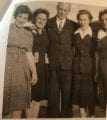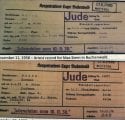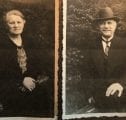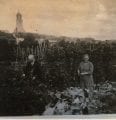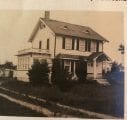- Local Survivor registry
- MAX STERN
- Local Survivor registry
- MAX STERN
Survivor Profile
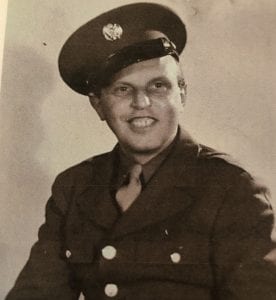
MAX
STERN
(1907-1995)
PRE-WAR NAME:
MAX STERN
MAX STERN
PLACE OF BIRTH:
GEISA, GERMANY
GEISA, GERMANY
DATE OF BIRTH:
JANUARY 8, 1907
JANUARY 8, 1907
LOCATION(s) BEFORE THE WAR:
GEISA, GERMANY; VINELAND, NEW, NEW JERSEY; FULDA, GERMANY; NEUHAIM, GERMANY; BUCKENWALD CONCENTRATION CAMP
GEISA, GERMANY; VINELAND, NEW, NEW JERSEY; FULDA, GERMANY; NEUHAIM, GERMANY; BUCKENWALD CONCENTRATION CAMP
LOCATION(s) DURING THE WAR:
GEISA, BELGIUM, FRANCE, SPAIN , PORTUGAL, HOBOKEN, NEW JERSEY, US ARMY
GEISA, BELGIUM, FRANCE, SPAIN , PORTUGAL, HOBOKEN, NEW JERSEY, US ARMY
STATUS:
SURVIVOR, REFUGEE
SURVIVOR, REFUGEE
RELATED PERSON(S):
MARTHA MARX STERN - Spouse (Deceased),
JOAN RITA ARSHEN - Daughter,
HOWARD JAMES STERN - Son,
HERMANN STERN - Father (Deceased),
JOHANNA STERN - Mother (Deceased)
-
BIOGRAPHY BY JOAN (STERN) ARSHEN, DAUGHTER
The Life of Max Stern as told to his daughter, Joan (Stern) Arshen
Max Stern’s father, Hermann Stern, also known to the grandchildren as Opa, was born on April 9, 1873 and Max’s mother, Johanna Goldschmidt, Oma, was born December 8, 1879. They lived at 64 Schulstrasse, Geisa in the state of Theuringen, Germany. Opa was a Viehhandler – Cattle Dealer.
The house, where Max lived, was small but he had his own room. There was no bathroom in the house but they had an outhouse. They would take water from the kitchen upstairs to wash in the morning. The barn was attached to the house. They usually kept 7-8 cows at a time at home. If they needed extra stall space, they would house the cows next door.
Max received one year of violin lessons when he was 13. He continued to play the violin for the family when he came to America. He usually played without looking at the notes.
Max went to school through the eighth grade. At the age of 14, he studied as an apprentice in a grocery store where he worked and received room and board in Hessen, Germany. He wrote home that he did not like the work of plucking chickens and gardening, since he felt he could do the same job at home. He left after one year and went into business with his father. He sold cows from house to house and ran the business.
At the age of 22, Max became the cantor in the synagogue in Geisa. When he fled to America and moved to Vineland, New Jersey, he continued to be a cantor at the German congregation that he attended. In 1935 or 36, Max went to Hashara-Gehring by Fulda, Germany to train for placement in Israel. He could not go directly to Israel without the training. The training program was run by the Mizrachi Organization to which Max belonged when he came to America. He studied agriculture at Hashara. He also studied to be a gardener in Hamburg.
After 1933, the business started to fail with the takeover of the Nazis. One day, Max’s father went to market with 20 cows. The Nazis cut off the ropes holding the cows and all the cows ran. His father was able to retrieve all the cows and took them home. In 1937, they had to give up the business. At the same time, in 1937, all Polish descendants were sent to the camps and never returned. Max knew the Nazis had also taken the Gypsies. An SS officer told Max’s cousin to get out of town because he knew what the Nazis were planning to do.
In 1937, Max went to Neuhaim for training. On November 9, 1938, Max was arrested from Neuhaim and sent to Buchenwald. (The information recorded at Buchenwald and received from Stefanie Dellemann in 2014 noted that Max was transferred to Buchenwald on November 11, 1938 after he had been arrested by the police in Damstadt on November 10. He was registered with the prisoner number 22019 and was released on December 23, 1938. Max had remembered the dates slightly differently.)
Max was taken by bus to the camp. On the way to the camp, they drove through Geisa, Max’s hometown. He wanted to jump out of the bus, but knew he would be shot. Luckily Max had taken his coat with him because it was very cold. When they arrived at the camp, he met his father. (Stefanie Dellemann from Buchenwald stated that Hermann Stern, Max’s father was taken to Buchenwald on November 10, 1938 and arrested the same day from his house. His prisoner number was 20957. He was released on November 23, 1938.) The barracks were not complete when Max and his father arrived. Ten thousand men were arrested the same day. By the next morning, only 9,000 were alive. Max slept on shelves in the bunks with no straw. They ate whale soup. One religious man asked Max what he should do about eating since he was Kosher and Max replied that you have to eat anything to stay alive. There was no water to drink so prisoners opened their mouths to catch the rain in order to get some water.
In the camp, prisoners threw themselves against the barb wire wanting to die. The Nazis gave some prisoners poison pills to annihilate them. One day the Nazis called for all men over 30 to come forward to work in the rock quarry with blue stones. Max took a chance and stayed back. No one questioned him. Half the men that left that morning did not come back.
On another day, a man from Vienna had stolen a piece of bread. As a result, he was hung in front of everyone while music from Vienna was played. Max remembers whippings of prisoners which were inflicted by the Nazis. Max also remembers having to carry the dead from the sheds to the ovens.
When they first came into the camp, they had to remove their belts so everyone walked around with their hands in their pockets to hold their pants up. Max came into the camp weighing 135 pounds. When he left after 6 weeks, he weighed 60 pounds. Max was released from the camp December 25, 1938. His father was released after three weeks since he was an army veteran from World War I.
When Max returned home, the synagogue had been destroyed by the Nazis. Max also suffered from a severe ear infection he had as a result of the imprisonment. The ear infection left him temporarily deaf. He could not go to the doctor because the Nazis threatened him if he revealed anything about the camp.
In 1940, the family home was sold to the high school next door, since the family had no more money due to the Nazis closing the Jewish businesses. The price that the house was sold for is unknown. The money had to be paid to a savings bank and Herman and Johanna Stern, Max’s parents, could take off an amount each month to live.
Max’s mom had gotten a fake South American certificate to Santo Domingo for him with the name STERN on it to help him leave Germany. He claimed he had a first cousin named Betty Stern in America who could sponsor him. She was really a distant cousin. They would not believe that the relative was a direct cousin but Max went back to the counsel several times and they finally believed him. His sister, Nellie, his brother in law Willie, his other sisters, Betty and Liesel and her husband, Isi paid The Joint (American Jewish Organization) $431.21 for a ticket on the boat so that Max could sail to America. When Max left for America in June, 1941, his father said to him, “I’ll never see you again.”
Max left Geisa on a truck driven by a friend. The friend told him to lay down so the Nazis could not see him. He was taken to Hunfeld to catch a train for Berlin. In Berlin, he lived with his Aunt Jenny for three weeks. Then he took a train to Belgium, went through France, then Spain, and finally arrived in Portugal. When he got on the train, there was another train at the station taking people to the camps. He was never sure where he was going and had his bags searched over and over again by Nazis. In Portugal he boarded a freight ship, Mouzinho, and was able to get a regular room for the trip to America.
Max’s sister, Nellie met him at the boat on June 21, 1941. He stayed with her for a couple days and then went to live with his cousin, Max Marx, who got him a job in a furniture factory in Hoboken. Max Marx emigrated to New York on 8/16/1939. In October, 1941, Max’s mother sent a telegram to Dad to inquire about getting a certificate to go to Cuba. The Hilfsvere, an agency in Germany, sent the telegram to help Max’s mother come to the US. Tragically, she was arrested and deported to Belzyce Kreis Lublin concentration camp in Poland after June 10, 1942. We have a note from her with the information. Her name is immortalized at Yad Vashem with her city of residence as Schlustern (actually she was born in Schlustern) although she was arrested from her home in Geisa. Before she left, on March 26, 1942, Max’s father, died of asthma and heart failure. He is buried in the cemetery in Geisa.
Other Family Information
- Martha (Marx) Stern, Max’s Wife, emigrated alone to the US. She sailed on the SS. Washington, left Hamburg on the 5th of April, 1939 and arrived in NY on April 15, 1939. Leo Ermann sponsored her according to the book, Familienbuch – Heritage Book.
- Martha’s sister, Hedwig, emigrated alone in 1937 on the ship SS Berengaria which left Cherbourg on January 13, 1937 and arrived in NY on January 20, 1937. Leo Ermann was her sponsor according to the Familienbuch – Heritage Book.
- Three of Max’s sisters fled Germany for the US and one sister fled to England. They were not in any camps.
- Johanna Stern, Max’s mother, was sent to Belcyze Kreis Lublin in Poland after June 10. 1942. She perished at the camp.
- Adelheid (nee Goldschmidt) and Meier Rosenberg, Max’s Aunt and Uncle, perished in a concentration camp in April, 1943.
- Jenny (nee Hecht), Max’s aunt, married David Goldschmidt, Max’s uncle. Aunt Jenny perished in Auschwitz and was arrested from Berlin.
- Augusta (nee: Uhlfelder), Max’s Aunt Gussie married Max’s uncle Max Goldschmidt. Augusta perished in Teresienstadt in 1942.
- Fanny (nee Stern) Loebenstein, Max’s aunt, was deported to a concentration camp and perished.
- Franzie Stern, Max’s cousin, was deported to Poland, probably to Auschwitz in 1942 where she perished.
Editor’s Note:
Refer to Historical Notes below for Geisa
-
SURVIVOR INTERVIEW:
Refer to Max Stern’s Biography above by Joan Stern Arshen, daughter
-
HISTORICAL NOTES:
GEISA:
Geisa is a town in the Wartburgkreis district, in Thuringia, Germany. It is situated in the Rhön Mountains, 26 km northeast of Fulda. The near border with Hesse was the border between West Germany and the GDR during the Cold War. Thus, Geisa was in the East German border restriction area of the former inner German border, which meant that until reunification access to the town was limited. The town is the westernmost municipality in what was formerly East Germany.
-
Sources and Credits:
Credits:
The SSBJCC Holocaust Memorial and Education Center gratefully acknowledges donation by Joan Stern Arshen of “The Life of Max Stern as told to his daughter, Joan (Stern) Arshen” as well as digital historic and family photographs and documents.


